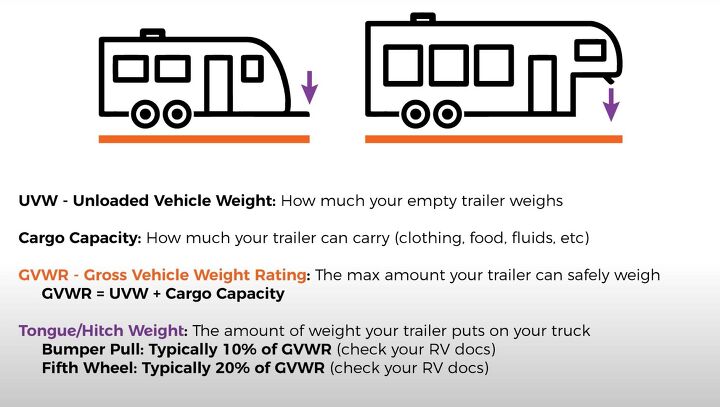Towing Safety: Everything You Need to Know to Tow a Truck or Trailer

A lot of people blow how to tow a trailer way out of proportion. I think it's a lot easier than some people realize. We're going to talk about towing capacities, which is unloaded vehicle weights, gross weights, gross combined weights, payloads, tongue weights, capacities, all of that stuff.
Let's go ahead and jump into everything.
Trailer numbers
Whether you are towing a travel trailer or a fifth wheel, there are a few numbers you need to know. First, there's unloaded vehicle weight, also called UVW on your stickers. This is how much your empty trailer weighs.
The second is cargo capacity. This is how much the manufacturer says you can add to that trailer safely. That's going to be all your clothes, your food, your fluids, everything.
Next, we have the gross vehicle weight rating, GVWR. This is the first super important one. This is the maximum amount the manufacturer says that your trailer can safely weigh.
The next important thing, and this is where travel trailers and fifth wheels differ just a little bit, is tongue or hitch weight. Sometimes a manufacturer will give you this number and sometimes you don't have it.
A good rule of thumb is for a bumper pull, it's typically going to be 10% of your gross vehicle weight rating. For a fifth wheel, it's typically going to be about 20% of your gross vehicle weight rating.
Truck numbers
Next up, let's talk about trucks. The first important number is your curb or empty weight. This is how much your truck weighs when it's empty.
Next up is your payload or cargo capacity. This is how much your truck can carry, whether it's in the back or it's up in the cab with your passengers or it's all the fluids like gasoline and oil and transmission fluid.
Next up is your gross vehicle weight rating. Your GVWR. This is the same acronym from the trailers, which is where it can get a little bit confusing. This is the maximum amount the manufacturer says that your truck can safely weigh by itself.
Gross combined vehicle weight
Next up, and this is the big one for us, is the Gross combined vehicle weight rating. This is either shown as GCWR or GCVWR.
The important thing is the C. If you see the C in your acronym, this is the combined weight rating. This is the maximum amount that your truck and trailer and all of the cargo added together can safely weigh. This is the big number.
Sometimes you can find a max trailer weight rating from a manufacturer. If you can find this number, you're golden. You don't have any math to do, you just have a max trailer weight number and you're good to go.
Here you can see we have a travel trailer and a truck and we have a fifth wheel and a truck first. If you have that manufacturer's max trailer weight number, that is how much you can tow.
If you don't have a max trailer weight number, you can get this number yourself by subtracting your truck's gross vehicle weight rating from its gross combined weight rating. That is how much you can tow.
If your maximum payload is 3,000 pounds and you have a travel trailer weighing 10,000 pounds, your travel trailer's tongue weight is going to be about 10% or 1,000 pounds and that goes towards your truck's payload. So that leaves you 2,000 pounds for passengers, cargo, fluids, and all that stuff.
If this is a 10,000-pound fifth wheel, it adds 20% or 2,000 of tongue weight, leaving you only a thousand pounds for everything else in your truck: passengers, cargo, gasoline, generators, and whatever you need to carry.
Where to get the numbers for trucks
For trucks, you're going to find your gross vehicle weight rating and sometimes your gross combined weight rating on the door sticker.
If you open your door, there should be a sticker on the inside that should give you a bunch of numbers. At least your gross vehicle weight rating should be there. If the combined number is not there, check your manual.
If you don't have the manual or you are researching a truck to buy, you can do some searching online. One quick way to find that out is by using manufacturers' towing guides. A lot of more recent trucks will have PDFs available online. Ford, Dodge, GMC, Chevy, all of them.
Where to get the numbers for trailers
Thankfully, those are much easier to find, and there are also fewer of them. You can find those on a sticker on the side of the RV.
Or if you're just researching RVs online, you can almost always find them in the listings for trailers. If it’s an older trailer, do a little research to get the most accurate numbers.
One thing that I like to tell a lot of people is that towing is not about what you can pull. It's about what you can stop. Just because you can get a 20,000-pound RV moving down the road does not mean you can safely stop it or turn it or maneuver it in any other way.
Especially if you're somewhere in Colorado where you have these big mountains to get over.
Towing safety
You need to make sure when towing a trailer that your truck is powerful enough to pull your trailer, everything that's in the trailer, everything that's in the truck, and is also powerful enough to stop all of that safely.
Do you have an RV and trailer? Share what size trailer you’re towing in the comments below.






















Comments
Join the conversation